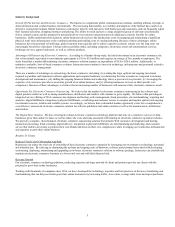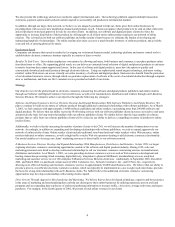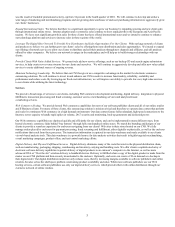Digital River 2002 Annual Report Download - page 19
Download and view the complete annual report
Please find page 19 of the 2002 Digital River annual report below. You can navigate through the pages in the report by either clicking on the pages listed below, or by using the keyword search tool below to find specific information within the annual report.13
• our ability to retain and attract personnel commensurate with our business needs.
In addition, revenue generated by our Software and Digital Commerce Services Division is likely to fluctuate on a seasonal basis that is typical
for the software publishing market in general. We believe that our first and fourth quarters are seasonally stronger than our second and third
quarters due to the timing of demand of tax preparation software and the holiday selling period. We also believe that software publishers avoid
new product releases in the summer months.
Our operating expenses, which include sales and marketing, product research and development and general and administrative expenses, are
based on our expectations of future revenue and are relatively fixed in the short term. If our revenue for a quarter fall below our expectations and
we are unable to quickly reduce spending in response, our operating results for that quarter would be harmed. In addition, the operating results
of companies in the electronic commerce industry have, in the past, experienced significant quarter-to-quarter fluctuations that may adversely
affect our stock price.
A loss of any client that accounts for a large portion of our revenue could cause our revenue to decline.
One software publisher client, Symantec Corporation, accounted for approximately 23% of our revenue in 2002. In addition, a limited number
of other software and E-business clients contribute a large portion of our annual revenue. Contracts with our clients are generally short term in
nature. If any one of these contracts is not renewed or otherwise terminates, and if we are unable to replace it with other client agreements, our
revenue would decline and our ability to sustain profitability would be impaired. It is important to our ongoing success that we maintain these
client relationships and, at the same time, develop new client relationships.
Our sales cycle is lengthy, which may cause us to incur substantial expenses and expend management time without generating
corresponding revenue, which would impair our cash flow.
We market our services directly to software publishers, online retailers and E-Business prospects. These relationships are typically complex and
take time to finalize. Due to operating procedures in many organizations, a significant amount of time may pass between selection of our
products and services by key decision-makers and the signing of a contract. The period between the initial sales call and the signing of a contract
with significant sales potential is difficult to predict and typically ranges from six to 12 months. If at the end of a sales effort a prospective client
does not purchase our products or services, we may have incurred substantial expenses and expended management time that cannot be recovered
and that will not generate corresponding revenue. As a result, our cash flow and our ability to fund expenditures incurred during the sales cycle
may be impaired.
General economic uncertainty may reduce our revenue.
The revenue growth and profitability of our business depends significantly on the overall demand for Internet-based electronic commerce
solutions. We believe that the market for these solutions may be adversely affected by a number of factors, including reductions in capital
expenditures by clients and the overall weakening of the U.S. and foreign economies. Additionally, the continued military responses to the
terrorist attacks on the United States, possible future terrorist attacks and the growing threat of war may exacerbate current economic conditions
and lead to further weakening in the economy.
These factors may, in turn, give rise to a number of market trends that may slow our revenue growth, including:
• longer sales cycles;
• deferral or delay of electronic commerce projects and generally reduced expenditures for electronic commerce solutions and related
services; and
• increased price competition.
If the current economic slowdown continues, the effects of the slowdown for electronic commerce solutions could reduce our revenue and limit
our ability to meet our profitability goals.
Our failure to attract and retain software publishers as clients would cause our revenue to decline.
Our Software and Digital Commerce Services Division generates revenue by providing outsourced services to software publishers. If we cannot
develop and maintain satisfactory relationships with software publishers on acceptable commercial terms, we will likely experience a decline in
revenue. We also depend on our software publisher clients creating and supporting software products that end-users will purchase. If we are
unable to obtain sufficient quantities of software for any reason or if the quality of service provided by these software publishers falls below a
satisfactory level, we could also experience a decline in revenue and end-user satisfaction, and
























